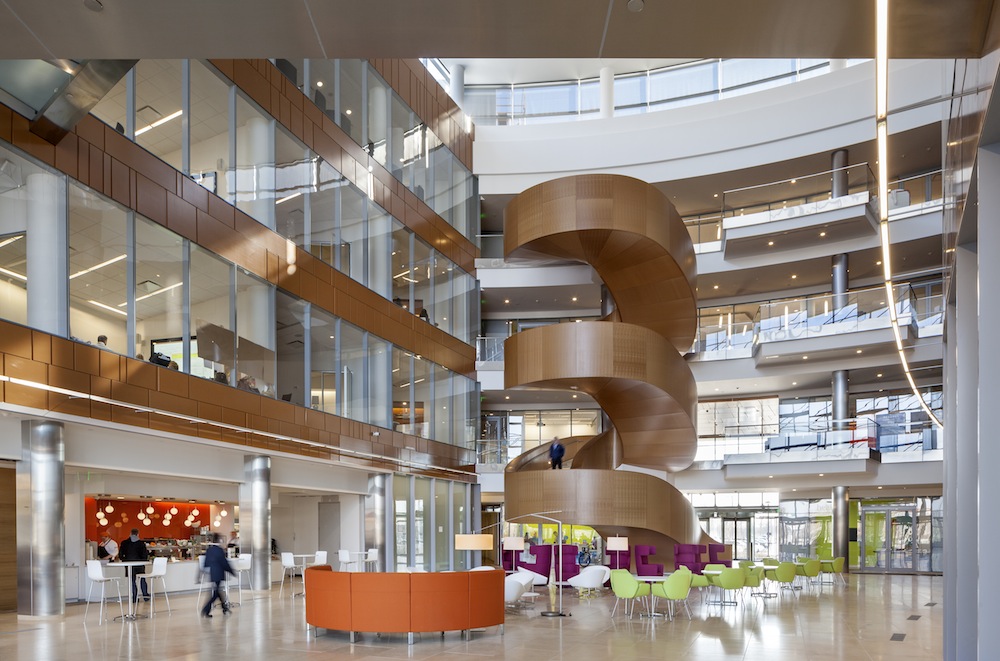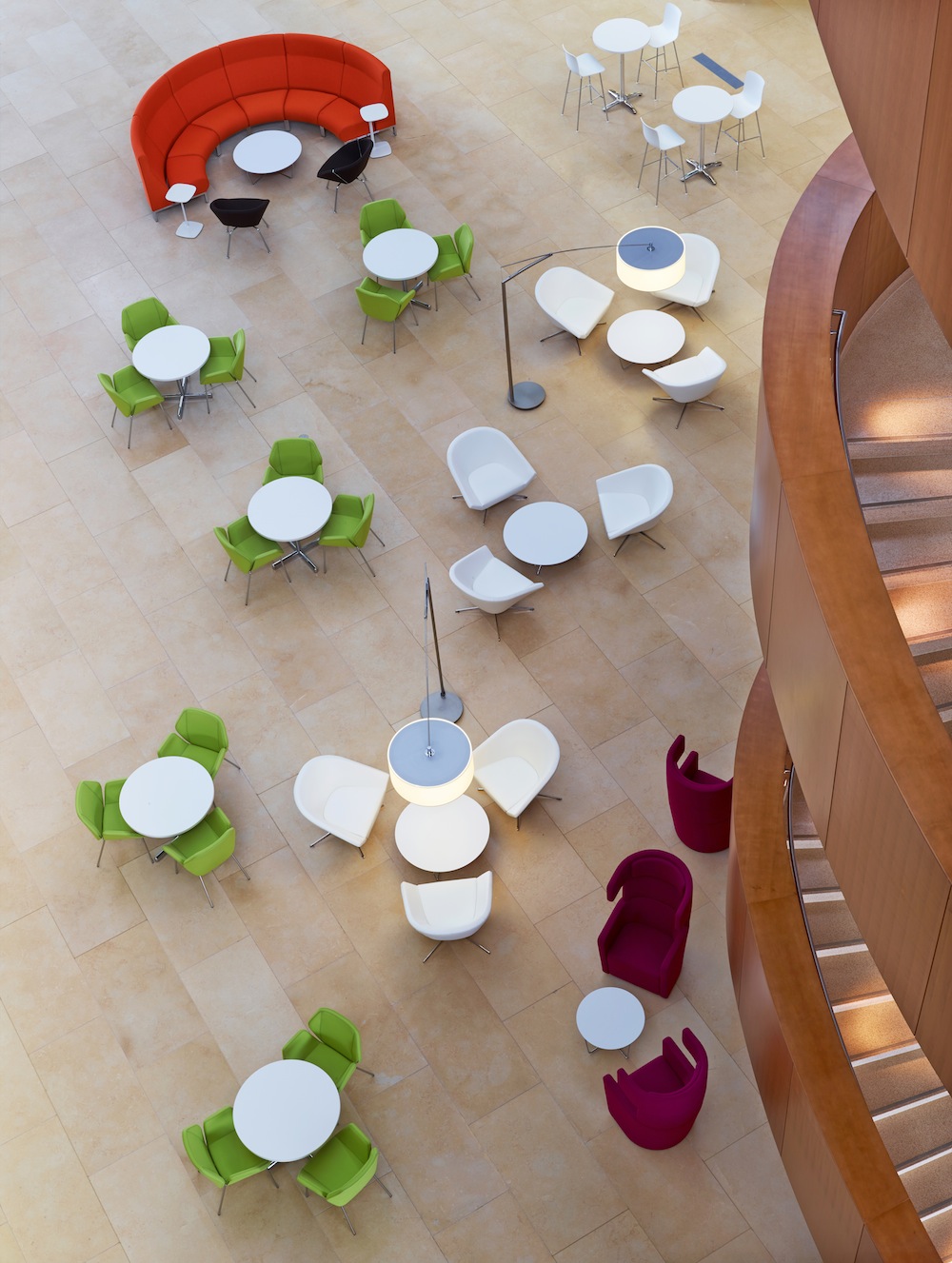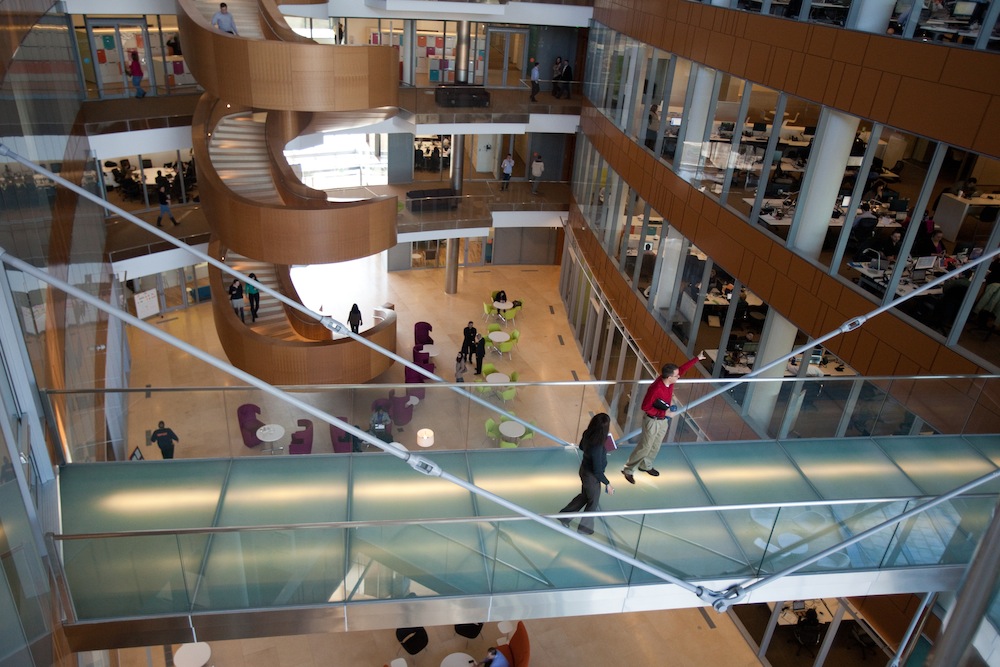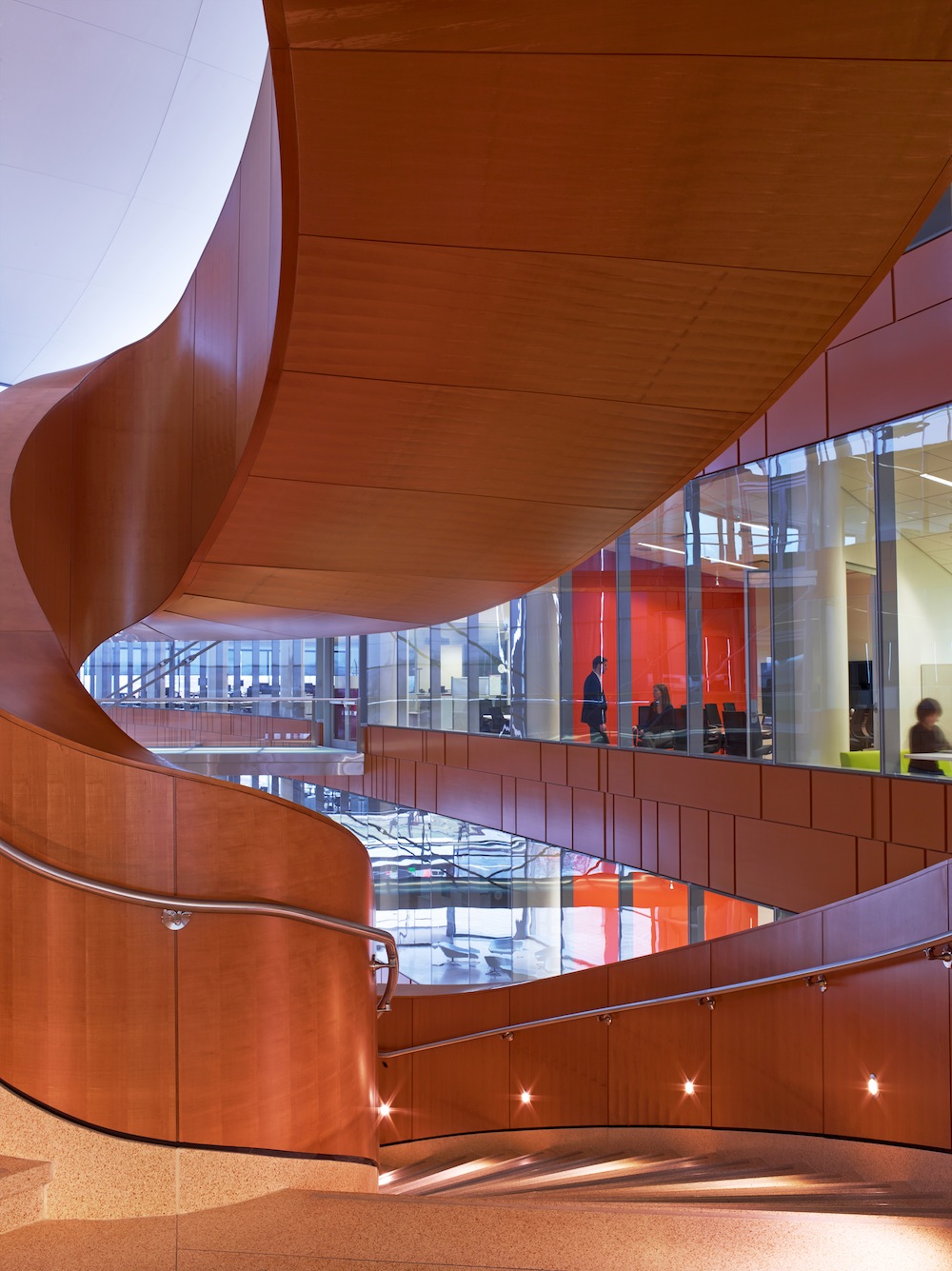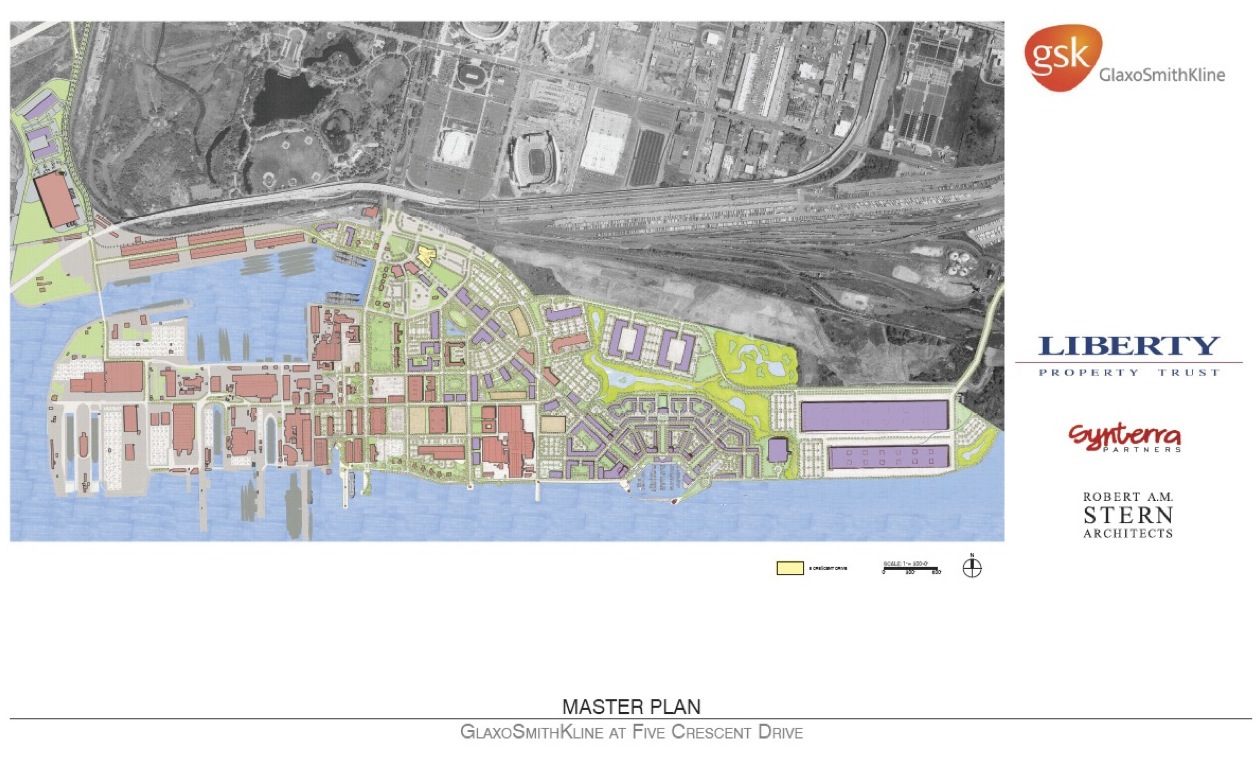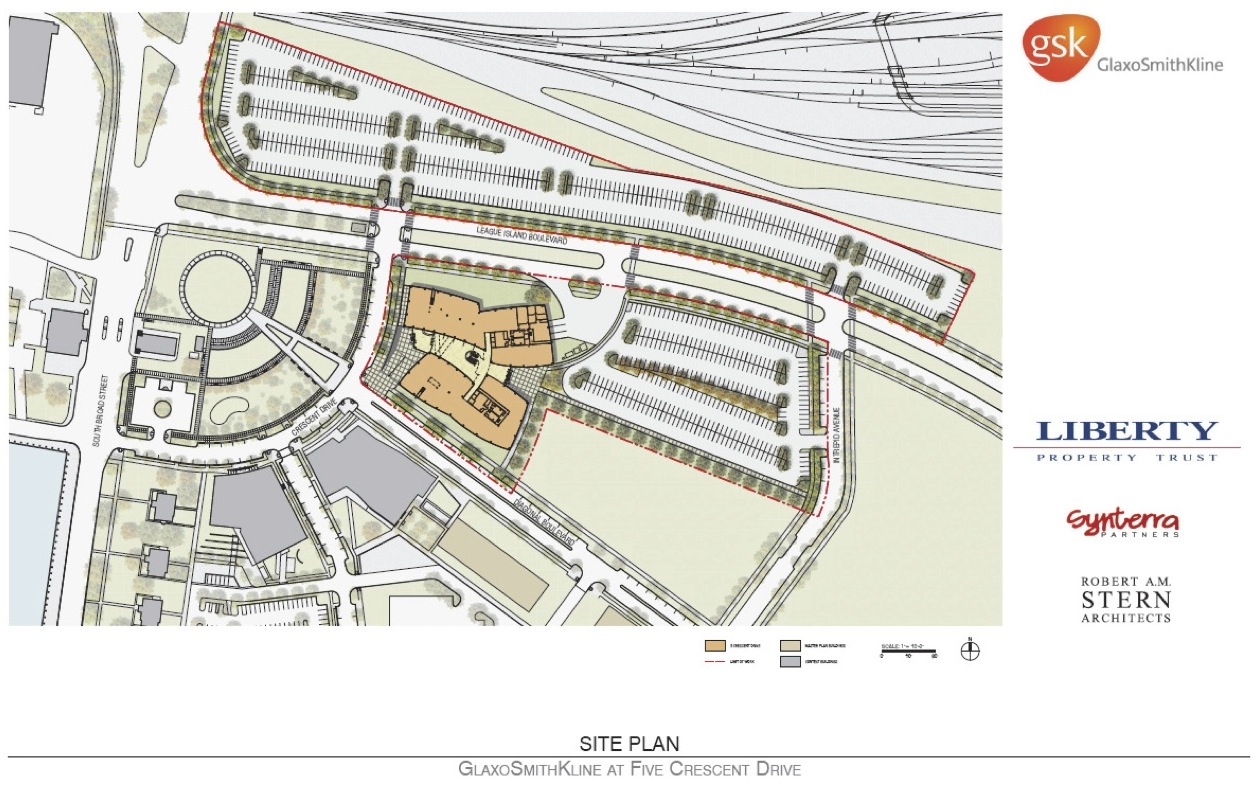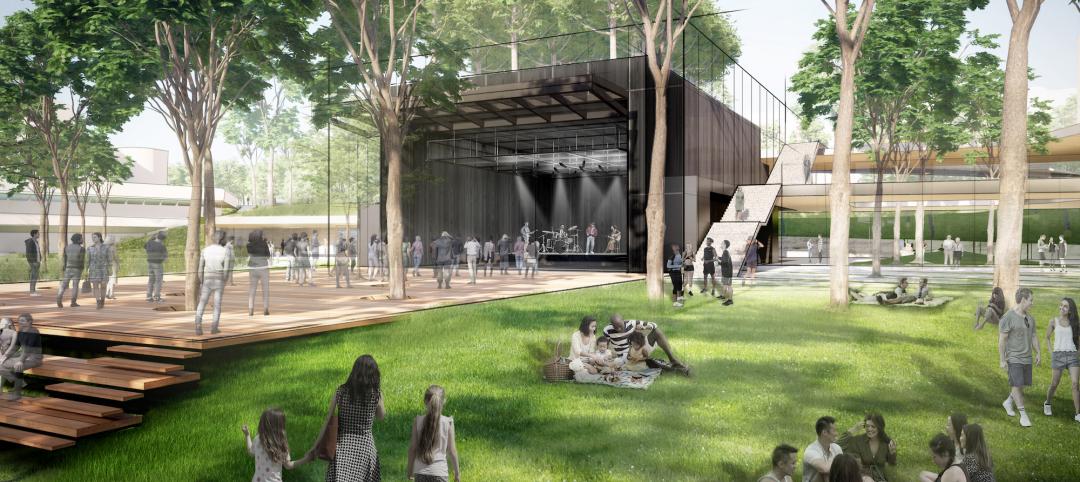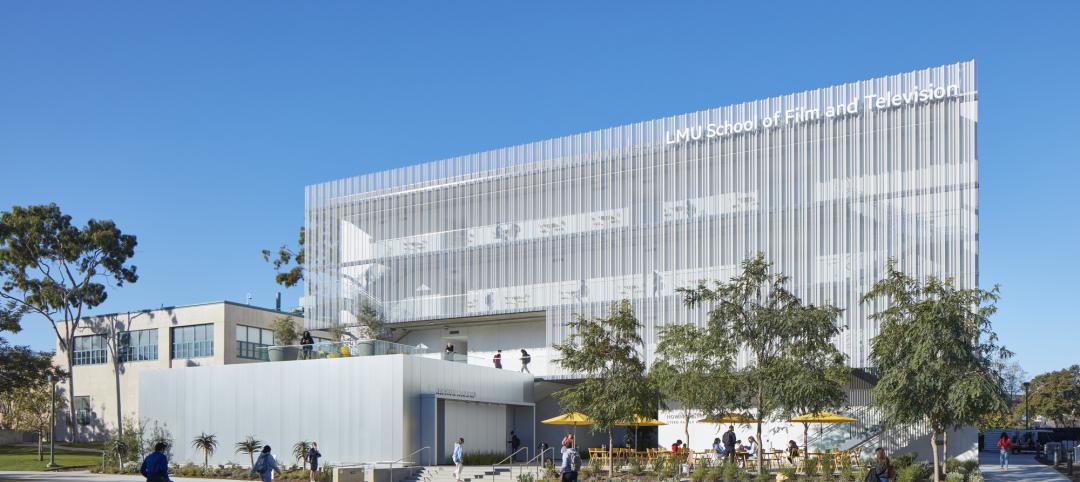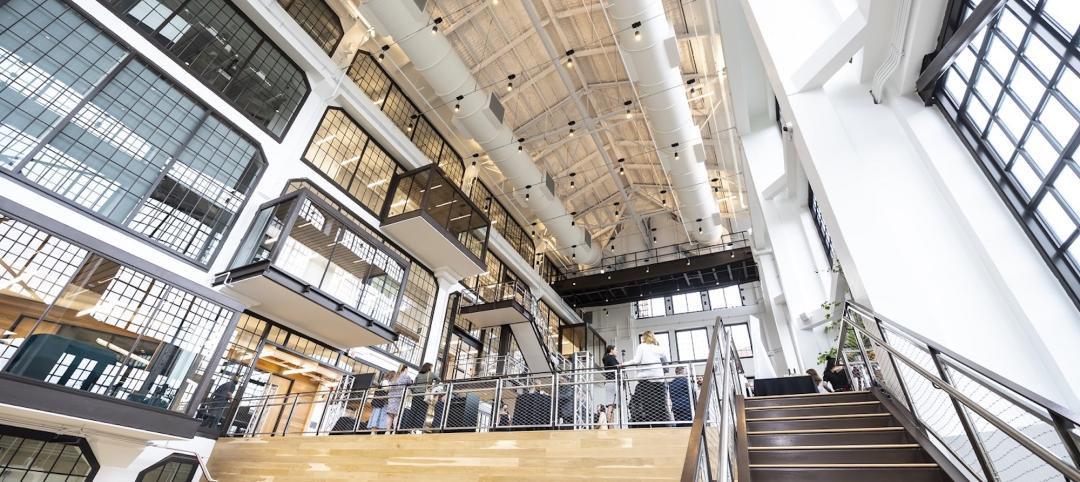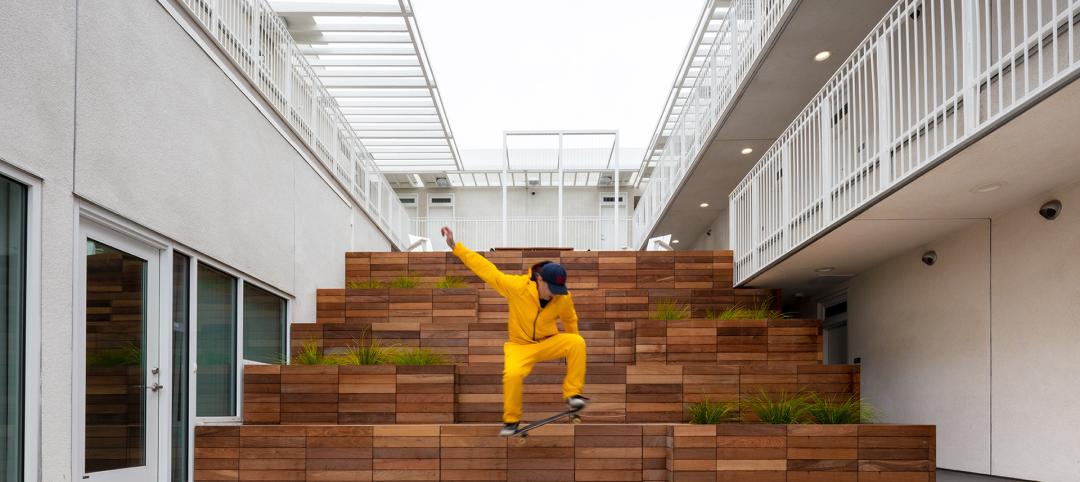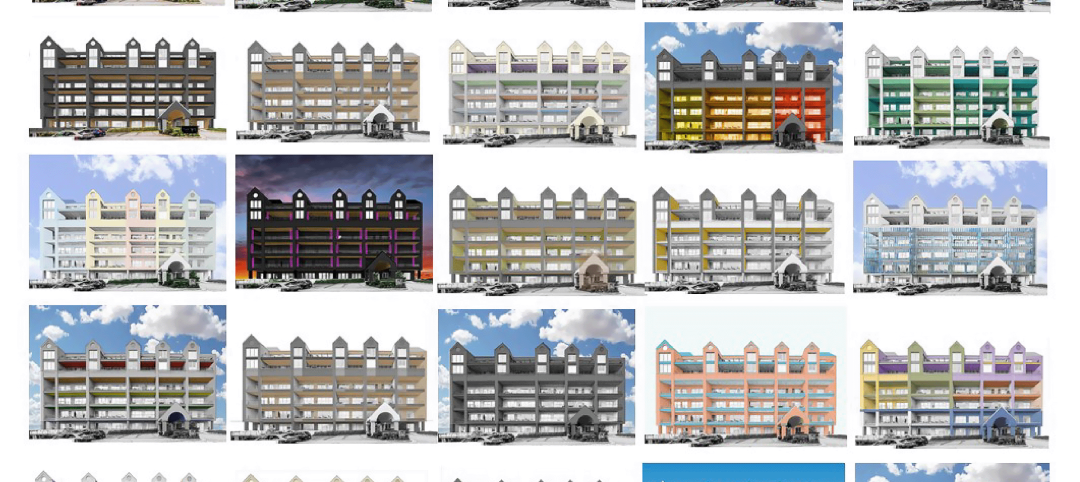GlaxoSmithKline officially opened its new double LEED Platinum certified facility in Philadelphia’s Navy Yard Corporate Center earlier today, ushering in a new era of how people work in Philadelphia. Employees, families and friends celebrated a ribbon-cutting ceremony with GSK President of North America Pharmaceuticals Deirdre Connelly, Liberty Property Trust Chief Executive Officer Bill Hankowsky, Synterra Partners Principal Bill Wilson, design architect Robert A.M. Stern, workplace strategist and interior architect Francis Cauffman Principal John Campbell and Philadelphia Mayor Michael A. Nutter.
“Our new work space is designed to inspire and connect people,” says Deirdre Connelly, President, North America Pharmaceuticals, GSK. “My teammates and I are energized by this new environment, where we can do our best work and collaborate without the constraints of office walls.”
The 208,000 square foot building at Five Crescent Drive represents an $80 million investment by Liberty Property/Synterra, and an investment of approximately $70 million by GSK. GSK has signed a 15.5-year lease at the building, which includes a four-story central atrium, a monumental stairway, a coffee shop, cafeteria, fitness center, meeting centers and a large multi-purpose room.
“GSK’s new facility reflects the reality of The Navy Yard: it is a Philadelphia magnet for creative, forward-looking companies,” said Bill Hankowsky, Chief Executive Officer, Liberty Property Trust. “Innovation and growth are now synonymous with this dynamic environment.”
Photo: Francis Dzikowski / Esto for Robert A.M. Stern Architects, LLP
The four-story, glass-encased building with an open floor plan and grand central staircase has been awarded both Core & Shell™ and Commercial Interiors™ LEED® Platinum certification from the U.S. Green Building Council. It is the first double LEED® Platinum building in Philadelphia. It is anticipated that the innovative building systems will save as much as 30% of energy use when compared to a traditional building.
These substantial energy savings are the result of the state-of-the-art building façade and high-performance glass which maximize daylight in winter while reducing heat gain and providing shading in summer. ENERGY STAR-rated lighting and equipment, as well as an astronomical time clock and cloud sensor program, activate the automatic shades on windows to control glare. In addition smart meters track and monitor the building’s energy and water use and provide ongoing accountability for utility consumption and performance.
Photo: Francis Dzikowski / Esto for Robert A.M. Stern Architects, LLP
“It was GSK’s commitment to Philadelphia that put The Navy Yard well over the 10,000 employee mark,” said Mayor Michael A. Nutter. “Just 18 months ago we stood here to break ground on this project, and I am thrilled to be here today to celebrate the grand opening of one of the most innovative, healthy, and green work spaces in the US.
Sweeping views of Philadelphia are accessible from nearly 90% of the workspaces. In the office-less layout, employees are located in “neighborhoods” and can work in a variety of settings throughout the day. These include custom-designed sit-to-stand workstations, team tables, meeting areas, social areas with soft seating, and quiet rooms.
“Francis Cauffman is very excited to see employees working and interacting throughout the entire building, and to hear the highly positive employee response to their new workplace,” said John B. Campbell, LEED AP, AIA, RIBA, Principal-in-Charge of Workplace Strategies at Francis Cauffman. “By creating an open and healthy workplace environment focused on providing the right physical and IT tools with a wide variety of work settings throughout the building, the new workplace has transformed the level of energy, engagement and connectivity across the organization.”
Photo: Eric Laignel for Francis Cauffman
Daily service to and from Center City via The Navy Yard Express Shuttle along with plentiful parking and key amenities, such as parks with Wi-Fi access and recreational activities and the soon-to-be-completed Courtyard by Marriott, a flagship property with an upscale bar and restaurant, attract employees to a unique and vibrant setting.
Innovation and sustainability from top to bottom
Whether one starts on the top of the building, which offers a green rooftop, or at the front door apron which features Five Standards (Dazzle), a Mural Arts Program commissioned piece of public art by Virgil Marti, GlaxoSmithKline at The Navy Yard delivers excitement and energy. The five 16’ x 7’ foot steel and mirror polished stainless steel sculptures resemble looking glasses; their design fitting seamlessly along the GSK facade, which appears as a large transparent ship docked at Five Crescent Drive.
The roof is covered 40% with vegetation and an herb garden provides many benefits including: reducing energy costs by providing natural insulation; absorbing storm water reducing the burden on the public storm water system; offering a beautiful space for events and meetings; and providing additional workspace for employees. High-efficiency, low-flow plumbing fixtures are expected to reduce water use by as much as 50% as compared to a traditional building, which will save an estimated 1.8 million gallons of water per year.?
The building’s ventilation system provides 30% more fresh air than required by code and monitored by carbon dioxide sensors installed at high-density spaces which increase the amount of fresh air in those spaces as carbon dioxide levels increase. The GSK facility and its grounds have been designated as a non-smoking site.?
For more about the building, visit http://us.gsk.com/html/media-news/navy-yard-press-kit.html.
Photo: Francis Dzikowski / Esto for Robert A.M. Stern Architects, LLP
Photo: Francis Dzikowski / Esto for Robert A.M. Stern Architects, LLP
Photo: Eric Laignel for Francis Cauffman
Photo: Eric Laignel for Francis Cauffman
Related Stories
Sustainability | Jan 9, 2023
Innovative solutions emerge to address New York’s new greenhouse gas law
New York City’s Local Law 97, an ambitious climate plan that includes fines for owners of large buildings that don’t significantly reduce carbon emissions, has spawned innovations to address the law’s provisions.
Fire and Life Safety | Jan 9, 2023
Why lithium-ion batteries pose fire safety concerns for buildings
Lithium-ion batteries have become the dominant technology in phones, laptops, scooters, electric bikes, electric vehicles, and large-scale battery energy storage facilities. Here’s what you need to know about the fire safety concerns they pose for building owners and occupants.
Market Data | Jan 6, 2023
Nonresidential construction spending rises in November 2022
Spending on nonresidential construction work in the U.S. was up 0.9% in November versus the previous month, and 11.8% versus the previous year, according to the U.S. Census Bureau.
Industry Research | Dec 28, 2022
Following a strong year, design and construction firms view 2023 cautiously
The economy and inflation are the biggest concerns for U.S. architecture, construction, and engineering firms in 2023, according to a recent survey of AEC professionals by the editors of Building Design+Construction.
Performing Arts Centers | Dec 23, 2022
Diller Scofidio + Renfro's renovation of Dallas theater to be ‘faithful reinterpretation’ of Frank Lloyd Wright design
Diller Scofidio + Renfro recently presented plans to restore the Kalita Humphreys Theater at the Dallas Theater Center (DTC) in Dallas. Originally designed by Frank Lloyd Wright, this theater is the only freestanding theater in Wright’s body of work.
University Buildings | Dec 22, 2022
Loyola Marymount University completes a new home for its acclaimed School of Film and Television
California’s Loyola Marymount University (LMU) has completed two new buildings for arts and media education at its Westchester campus. Designed by Skidmore, Owings & Merrill (SOM), the Howard B. Fitzpatrick Pavilion is the new home of the undergraduate School of Film and Television, which is consistently ranked among the nation’s top 10 film schools. Also designed by SOM, the open-air Drollinger Family Stage is an outdoor lecture and performance space.
Adaptive Reuse | Dec 21, 2022
University of Pittsburgh reinvents century-old Model-T building as a life sciences research facility
After opening earlier this year, The Assembly recently achieved LEED Gold certification, aligning with the school’s and community’s larger sustainability efforts.
Multifamily Housing | Dec 20, 2022
Brooks + Scarpa-designed apartment provides affordable housing to young people aging out of support facilities
In Venice, Calif., the recently completed Rose Apartments provides affordable housing to young people who age out of youth facilities and often end up living on the street. Designed by Brooks + Scarpa, the four-story, 35-unit mixed-use apartment building will house transitional aged youths.
Coatings | Dec 20, 2022
The Pier Condominiums — What's old is new again!
When word was out that the condominium association was planning to carry out a refresh of the Pier Condominiums on Fort Norfolk, Hanbury jumped at the chance to remake what had become a tired, faded project.
Cladding and Facade Systems | Dec 20, 2022
Acoustic design considerations at the building envelope
Acentech's Ben Markham identifies the primary concerns with acoustic performance at the building envelope and offers proven solutions for mitigating acoustic issues.


